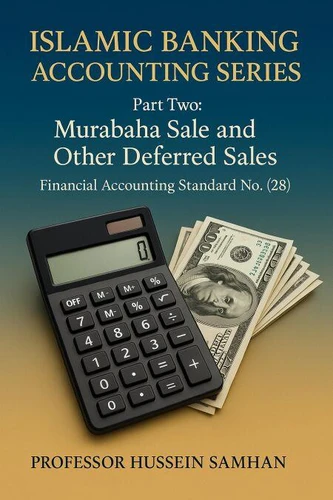Islamic Banking Accounting Series According to the Standards of the Accounting and Auditing Organization for Islamic Financial Institutions (AAOIFI). Part Two: Murabaha Sale and Other Deferred Sales Financial Accounting Standard No. (28), #2
Par : ,Formats :
Disponible dans votre compte client Decitre ou Furet du Nord dès validation de votre commande. Le format ePub est :
- Compatible avec une lecture sur My Vivlio (smartphone, tablette, ordinateur)
- Compatible avec une lecture sur liseuses Vivlio
- Pour les liseuses autres que Vivlio, vous devez utiliser le logiciel Adobe Digital Edition. Non compatible avec la lecture sur les liseuses Kindle, Remarkable et Sony
 , qui est-ce ?
, qui est-ce ?Notre partenaire de plateforme de lecture numérique où vous retrouverez l'ensemble de vos ebooks gratuitement
Pour en savoir plus sur nos ebooks, consultez notre aide en ligne ici
- FormatePub
- ISBN8231330492
- EAN9798231330492
- Date de parution17/05/2025
- Protection num.pas de protection
- Infos supplémentairesepub
- ÉditeurWalzone Press
Résumé
The sale of Murabaha is one of the legitimate forms of sale and a primary financing channel in Islamic banks-in fact, it is the most widely accepted structure among them. Although it is a controversial mode, Islamic banks favor it because it yields higher profits without more risk . To understand this structure-and why many believe it does not fulfill their genuine desire for truly halal transactions- in this section we will apply the provisions of the new Financial Accounting Standard No.?(28) issued by AAOIFI to explain in detail everything related to accounting for "compound Murabaha" (Murabaha to the purchase orderer) and other deferred-payment sales in the seller's and buyer's books.
We will then conclude the section with solved practical cases as well as exercises to help the reader practice what they have learned.2-1 Deferred sale2-2 Conditions for the validity of deferred sale2-3 The concept of Murabaha:2-4 Conditions for the validity of the Murabaha sale contract to the buyer:2-5 Murabaha forms (compound Murabaha sale):2-6 Practical procedures for Murabaha sales in Islamic banks:2-7 Financial Accounting Standard No.
(28): Murabaha and Other Deferred Sales2-7-1 Accounting for Murabaha and other deferred sales in the seller's books2-7-2 Takaful Fund (mutual insurance) in Islamic banks:2-7-3 Murabaha and other deferred sales in the buyer's financial statements2-8 Practical cases
We will then conclude the section with solved practical cases as well as exercises to help the reader practice what they have learned.2-1 Deferred sale2-2 Conditions for the validity of deferred sale2-3 The concept of Murabaha:2-4 Conditions for the validity of the Murabaha sale contract to the buyer:2-5 Murabaha forms (compound Murabaha sale):2-6 Practical procedures for Murabaha sales in Islamic banks:2-7 Financial Accounting Standard No.
(28): Murabaha and Other Deferred Sales2-7-1 Accounting for Murabaha and other deferred sales in the seller's books2-7-2 Takaful Fund (mutual insurance) in Islamic banks:2-7-3 Murabaha and other deferred sales in the buyer's financial statements2-8 Practical cases
The sale of Murabaha is one of the legitimate forms of sale and a primary financing channel in Islamic banks-in fact, it is the most widely accepted structure among them. Although it is a controversial mode, Islamic banks favor it because it yields higher profits without more risk . To understand this structure-and why many believe it does not fulfill their genuine desire for truly halal transactions- in this section we will apply the provisions of the new Financial Accounting Standard No.?(28) issued by AAOIFI to explain in detail everything related to accounting for "compound Murabaha" (Murabaha to the purchase orderer) and other deferred-payment sales in the seller's and buyer's books.
We will then conclude the section with solved practical cases as well as exercises to help the reader practice what they have learned.2-1 Deferred sale2-2 Conditions for the validity of deferred sale2-3 The concept of Murabaha:2-4 Conditions for the validity of the Murabaha sale contract to the buyer:2-5 Murabaha forms (compound Murabaha sale):2-6 Practical procedures for Murabaha sales in Islamic banks:2-7 Financial Accounting Standard No.
(28): Murabaha and Other Deferred Sales2-7-1 Accounting for Murabaha and other deferred sales in the seller's books2-7-2 Takaful Fund (mutual insurance) in Islamic banks:2-7-3 Murabaha and other deferred sales in the buyer's financial statements2-8 Practical cases
We will then conclude the section with solved practical cases as well as exercises to help the reader practice what they have learned.2-1 Deferred sale2-2 Conditions for the validity of deferred sale2-3 The concept of Murabaha:2-4 Conditions for the validity of the Murabaha sale contract to the buyer:2-5 Murabaha forms (compound Murabaha sale):2-6 Practical procedures for Murabaha sales in Islamic banks:2-7 Financial Accounting Standard No.
(28): Murabaha and Other Deferred Sales2-7-1 Accounting for Murabaha and other deferred sales in the seller's books2-7-2 Takaful Fund (mutual insurance) in Islamic banks:2-7-3 Murabaha and other deferred sales in the buyer's financial statements2-8 Practical cases



